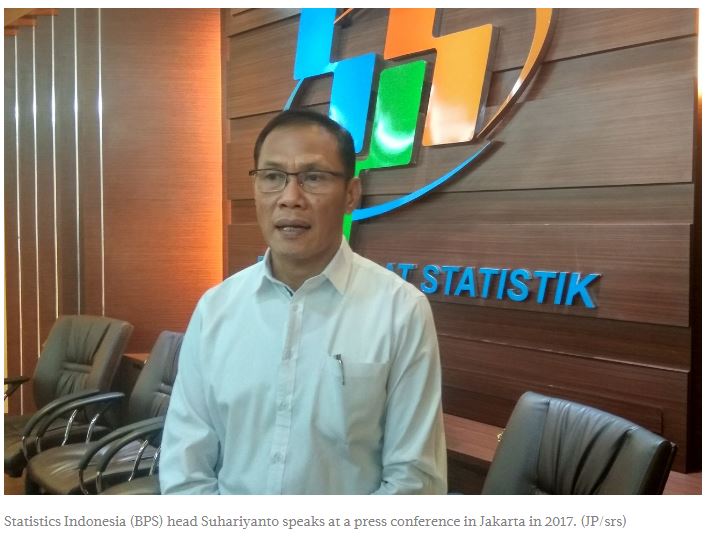Indonesia’s GDP grows 5.02 percent in Q3, slowest in over two years
Indonesia’s economic growth reached 5.02 percent in the third quarter, the lowest level in more than two years, with investment failing to contribute to the economy, which has been hit by a global economic slowdown driven by the trade war between the United States and China.
Statistics Indonesia (BPS) announced Tuesday that weak investment and low government spending, as well as low commodity prices that have exacerbated weak global demand, dragged down growth in the third quarter.
“The uncertain political situation [in the first and second quarters] significantly influenced the private sector’s [decision] to invest,” BPS head Suhariyanto told a press briefing in Jakarta.
He expressed hope investment growth would pick up, as some political uncertainties have been resolved with the naming of President Joko “Jokowi” Widodo’s new Indonesia Onward Cabinet.
Investment growth slumped to 4.21 percent year-on-year (yoy) in the third quarter, considerably lower than the 6.96 percent booked over the same period last year. A noticeable slowdown in investment was seen in the machinery and equipment sector, while negative growth was also recorded in the automotive and intellectual property sectors, among other sectors.
Government spending grew only 0.98 percent yoy in the third quarter, a far cry from the 6.27 percent growth booked over the same period last year, as spending on goods and services and social services declined, Suhariyanto added.
Household spending, which accounted for more than half of GDP, increased 5.01 percent yoy in the third quarter, slightly higher than the 5 percent yoy growth in the third quarter last year. The increase was driven by spending on tuition fees across all education levels and in the housing and home appliances sectors.
Lower imports of goods and services, which declined 8.91 percent yoy in the third quarter, alongside 0.02 percent yoy growth in exports of goods and services over the same period, led net exports to make a positive contribution to GDP.
“If we look at the global economy, the trade war is continuing between the US and China. This has resulted in an economic slowdown in a number of countries,” BPS chairman Suhariyanto told a press briefing in Jakarta.
The 5.02 percent economic growth rate in Q3 is lower than the 5.05 percent growth rate in the second quarter this year and the 5.17 percent growth rate in the third quarter in 2018. Year to date, economic growth has totaled 5.04 percent, according to Suhariyanto.
Ryan Kiryanto, chief economist at state lender BNI, attributed the overall economic growth slowdown to external factors, namely the ongoing trade war, rising geopolitical risks, including from uncertainties surrounding Brexit, and falling commodities prices.
“That has meant exports and imports have not contributed to GDP. In terms of domestic factors, weakening purchasing power and lower commodity prices in the mining and plantation sectors have led to household spending remaining stagnate at around 5 percent,” Ryan wrote in a text message.
“Government spending has stagnated, meaning it has not been sufficient to boost growth, while investment remains below optimum,” said Ryan, projecting a full year economic growth rate of between 4.95 and 5.05 percent for 2019.
Source: https://www.thejakartapost.com/news/2019/11/05/indonesias-gdp-grows-5-02-percent-in-q3-slowest-in-over-two-years.html


 English
English




